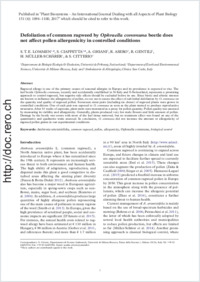Defoliation of common ragweed by Ophraella communa beetle does not affect pollen allergenicity in controlled conditions
- Lommen, Suzanne T. E. Departement de Biologie/Ecologie and Evolution, Université de Fribourg, Switzerland
- Ciappetta, S. Department of Earth and Environmental Sciences, Universit? di Milano-Bicocca, Italy
- Ghiani, A. Department of Earth and Environmental Sciences, Universit? di Milano-Bicocca, Italy
- Asero, R. Ambulatorio di Allergologia, Clinica San Carlo, Italy
- Gentili, R. Department of Earth and Environmental Sciences, Universit? di Milano-Bicocca, Italy
- Müller-Schärer, Heinz Departement de Biologie/Ecologie and Evolution, Université de Fribourg, Switzerland
- Citterio, S. Department of Earth and Environmental Sciences, Universit? di Milano-Bicocca, Italy
-
02.11.2017
Published in:
- Plant Biosystems - An International Journal Dealing with all Aspects of Plant Biology. - 2017, vol. 151, no. 6, p. 1094–1100
English
Ragweed allergy is one of the primary causes of seasonal allergies in Europe and its prevalence is expected to rise. The leaf beetle Ophraella communa, recently and accidentally established in N-Italy and S-Switzerland, represents a promising approach to control ragweed, but negative side effects should be excluded before its use. Since biotic and abiotic stresses are known to influence the allergenicity of pollen, we set out to assess the effect of sub-lethal defoliation by O. communa on the quantity and quality of ragweed pollen. Seventeen sister pairs (including six clones) of ragweed plants were grown in controlled conditions. One of each pair was exposed to O. communa as soon as the plant started to produce reproductive structures. After 10 weeks of exposure, plant traits were measured as a proxy for pollen quantity. Pollen quality was assessed by measuring its viability and allergenicity. Generally, plants produced very few male flowers and little amount of pollen. Damage by the beetle was severe with most of the leaf tissue removed, but no treatment effect was found on any of the quantitative and qualitative traits assessed. In conclusion, O. communa did not increase the amount or allergenicity of ragweed pollen grains in our experimental conditions.
- Faculty
- Faculté des sciences et de médecine
- Department
- Département de Biologie
- Language
-
- English
- Classification
- Biological sciences
- License
-
License undefined
- Identifiers
-
- RERO DOC 306206
- DOI 10.1080/11263504.2016.1244122
- Persistent URL
- https://folia.unifr.ch/unifr/documents/306376
Statistics
Document views: 104
File downloads:
- pdf: 182
